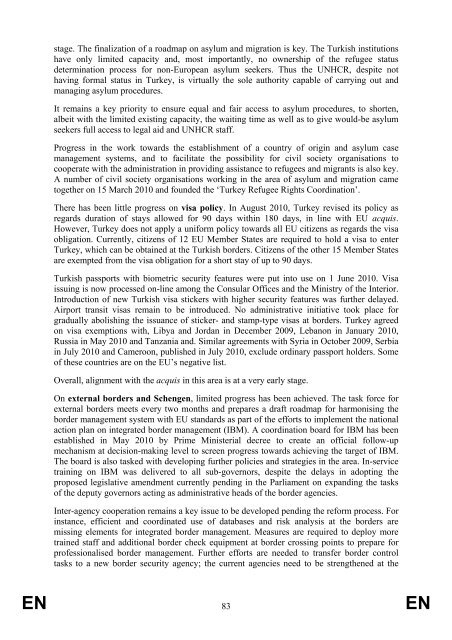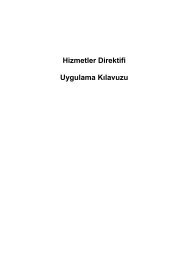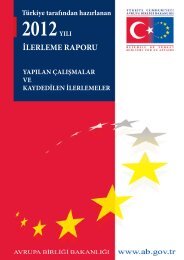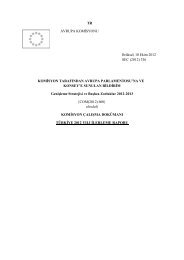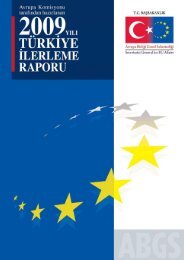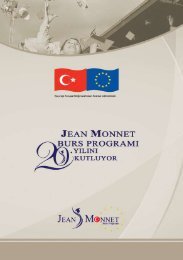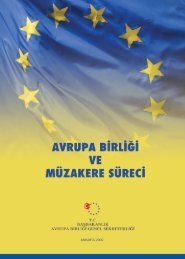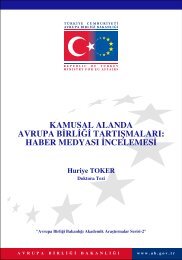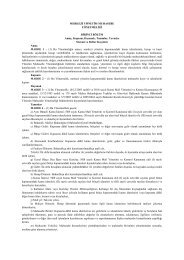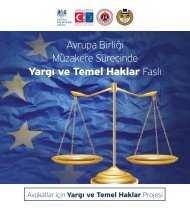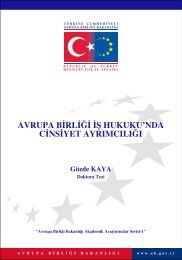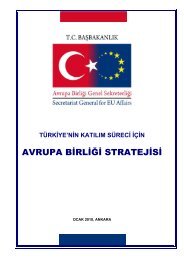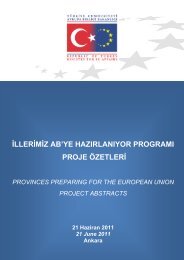2010 ilerleme raporu - Avrupa Birliği Bakanlığı
2010 ilerleme raporu - Avrupa Birliği Bakanlığı
2010 ilerleme raporu - Avrupa Birliği Bakanlığı
Create successful ePaper yourself
Turn your PDF publications into a flip-book with our unique Google optimized e-Paper software.
stage. The finalization of a roadmap on asylum and migration is key. The Turkish institutionshave only limited capacity and, most importantly, no ownership of the refugee statusdetermination process for non-European asylum seekers. Thus the UNHCR, despite nothaving formal status in Turkey, is virtually the sole authority capable of carrying out andmanaging asylum procedures.It remains a key priority to ensure equal and fair access to asylum procedures, to shorten,albeit with the limited existing capacity, the waiting time as well as to give would-be asylumseekers full access to legal aid and UNHCR staff.Progress in the work towards the establishment of a country of origin and asylum casemanagement systems, and to facilitate the possibility for civil society organisations tocooperate with the administration in providing assistance to refugees and migrants is also key.A number of civil society organisations working in the area of asylum and migration cametogether on 15 March <strong>2010</strong> and founded the ‘Turkey Refugee Rights Coordination’.There has been little progress on visa policy. In August <strong>2010</strong>, Turkey revised its policy asregards duration of stays allowed for 90 days within 180 days, in line with EU acquis.However, Turkey does not apply a uniform policy towards all EU citizens as regards the visaobligation. Currently, citizens of 12 EU Member States are required to hold a visa to enterTurkey, which can be obtained at the Turkish borders. Citizens of the other 15 Member Statesare exempted from the visa obligation for a short stay of up to 90 days.Turkish passports with biometric security features were put into use on 1 June <strong>2010</strong>. Visaissuing is now processed on-line among the Consular Offices and the Ministry of the Interior.Introduction of new Turkish visa stickers with higher security features was further delayed.Airport transit visas remain to be introduced. No administrative initiative took place forgradually abolishing the issuance of sticker- and stamp-type visas at borders. Turkey agreedon visa exemptions with, Libya and Jordan in December 2009, Lebanon in January <strong>2010</strong>,Russia in May <strong>2010</strong> and Tanzania and. Similar agreements with Syria in October 2009, Serbiain July <strong>2010</strong> and Cameroon, published in July <strong>2010</strong>, exclude ordinary passport holders. Someof these countries are on the EU’s negative list.Overall, alignment with the acquis in this area is at a very early stage.On external borders and Schengen, limited progress has been achieved. The task force forexternal borders meets every two months and prepares a draft roadmap for harmonising theborder management system with EU standards as part of the efforts to implement the nationalaction plan on integrated border management (IBM). A coordination board for IBM has beenestablished in May <strong>2010</strong> by Prime Ministerial decree to create an official follow-upmechanism at decision-making level to screen progress towards achieving the target of IBM.The board is also tasked with developing further policies and strategies in the area. In-servicetraining on IBM was delivered to all sub-governors, despite the delays in adopting theproposed legislative amendment currently pending in the Parliament on expanding the tasksof the deputy governors acting as administrative heads of the border agencies.Inter-agency cooperation remains a key issue to be developed pending the reform process. Forinstance, efficient and coordinated use of databases and risk analysis at the borders aremissing elements for integrated border management. Measures are required to deploy moretrained staff and additional border check equipment at border crossing points to prepare forprofessionalised border management. Further efforts are needed to transfer border controltasks to a new border security agency; the current agencies need to be strengthened at theEN 83 EN


